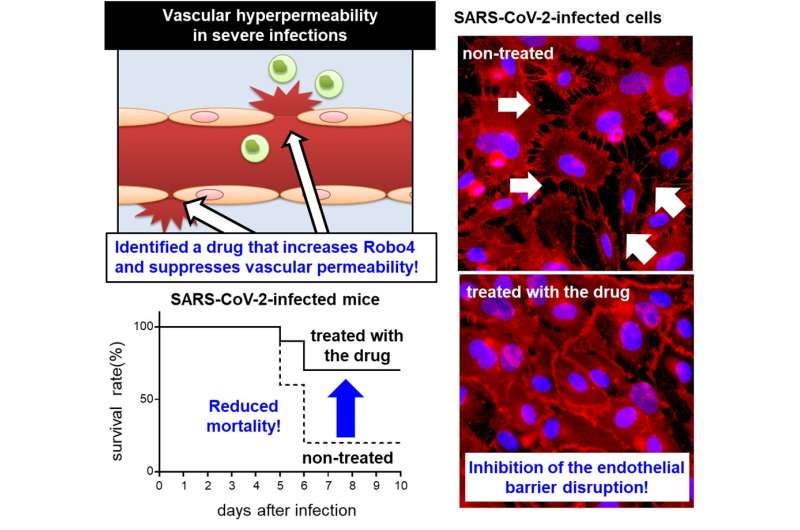Blood vessel protein found to reduce mortality in infectious disease

Pipes play an essential role in bringing water to the faucets in your home, but if one of those pipes springs a leak, damage can result. Similarly, the vascular system plays an essential role in carrying oxygen and nutrients throughout the body, but too much vascular permeability, or space between the cells lining the blood vessels, can have devastating results. Recently, researchers in Japan have shed new light on a key protein involved in vascular permeability and its impact on mortality in infectious disease.
In a new study published inPNAS, researchers led by Osaka University have demonstrated the potential of endothelial cell-specific protein Roundabout4 (Robo4) as a therapeutic target to reducemortalityresulting from severe infection. Robo4 is expressed byendothelial cellsthat line theblood vessels. These cells regulatevascular permeability并允许为交换的物质blood vessels into the surrounding tissue and vice versa.
During the body's immune response, vascularpermeabilityfacilitates the movement of important immune cells and the elimination of dangerous pathogens. However, in severe immune responses, such as may occur in infectious diseases like COVID-19, an excessive increase in vascular permeability, known as vascular hyperpermeability, may lead to organ damage and death.
Currently, no drugs directly suppress vascular hyperpermeability. Because Robo4 has been previously shown to play a role in vascular permeability, the Osaka University-led research team set out to explore Robo4 as a potential target to reduce vascular permeability in severe infection.
"To investigate the effects of Robo4 on vascular hyperpermeability, we generated an endothelial cell-specific mouse model of conditional Robo4 overexpression," says lead author of the study Maaya Morita. "Upon exposing these mice to lipopolysaccharide (LPS), which induces a severe immune response, the mice exhibited decreased vascular permeability and increased rates of survival."
The researchers screened a library of drugs using a mouse endothelial cell line to identify pathways that are involved in the regulation of Robo4 and found that two competitive SMAD signaling pathways appear to regulate Robo4 expression. When the researchers treated LPS-injected mice with a drug that inhibits ALK1-SMAD signaling, they observed increased Robo4 expression, decreased vascular permeability, and reduced mortality. A reduction in mortality was also observed in mice exposed to SARS-CoV-2, the virus that causes COVID-19.
"We were pleased to find that treatment with ALK1 inhibitor increases Robo4 expression and reduces mortality in mice under sepsis and SARS-CoV-2 conditions," says senior author Yoshiaki Okada. "Increasing Robo4 expression may represent a strategy to reduce vascular permeability and alleviate severe infections."
The research team's findings may aid in the development of preventative or therapeutic drugs to reduce the mortality rate of severeinfectious diseases, such as COVID-19.
The article, "Upregulation of Robo4 expression by SMAD signaling suppresses vascular permeability and mortality in endotoxemia and COVID-19 models," was published inProceedings of the National Academy of Sciences.
更多的信息:Maaya Morita et al, Upregulation of Robo4 expression by SMAD signaling suppresses vascular permeability and mortality in endotoxemia and COVID-19 models,Proceedings of the National Academy of Sciences(2023).DOI: 10.1073/pnas.2213317120


















